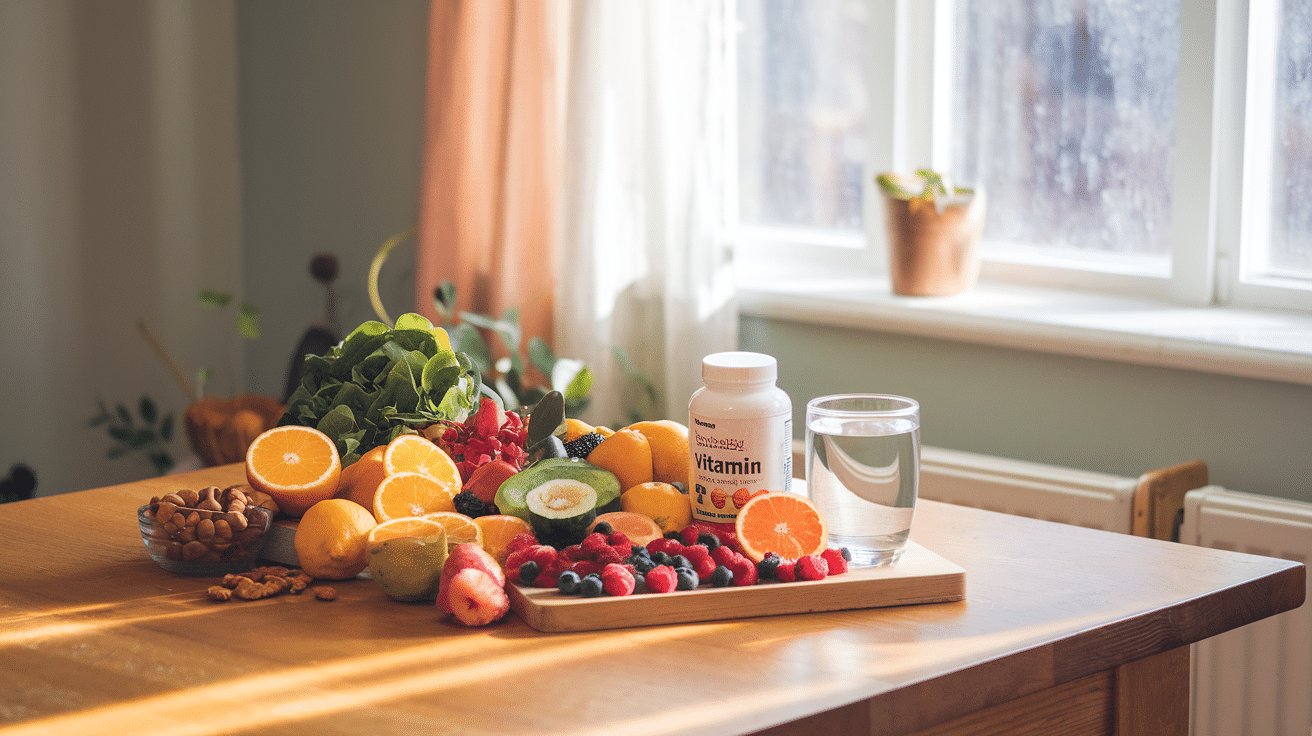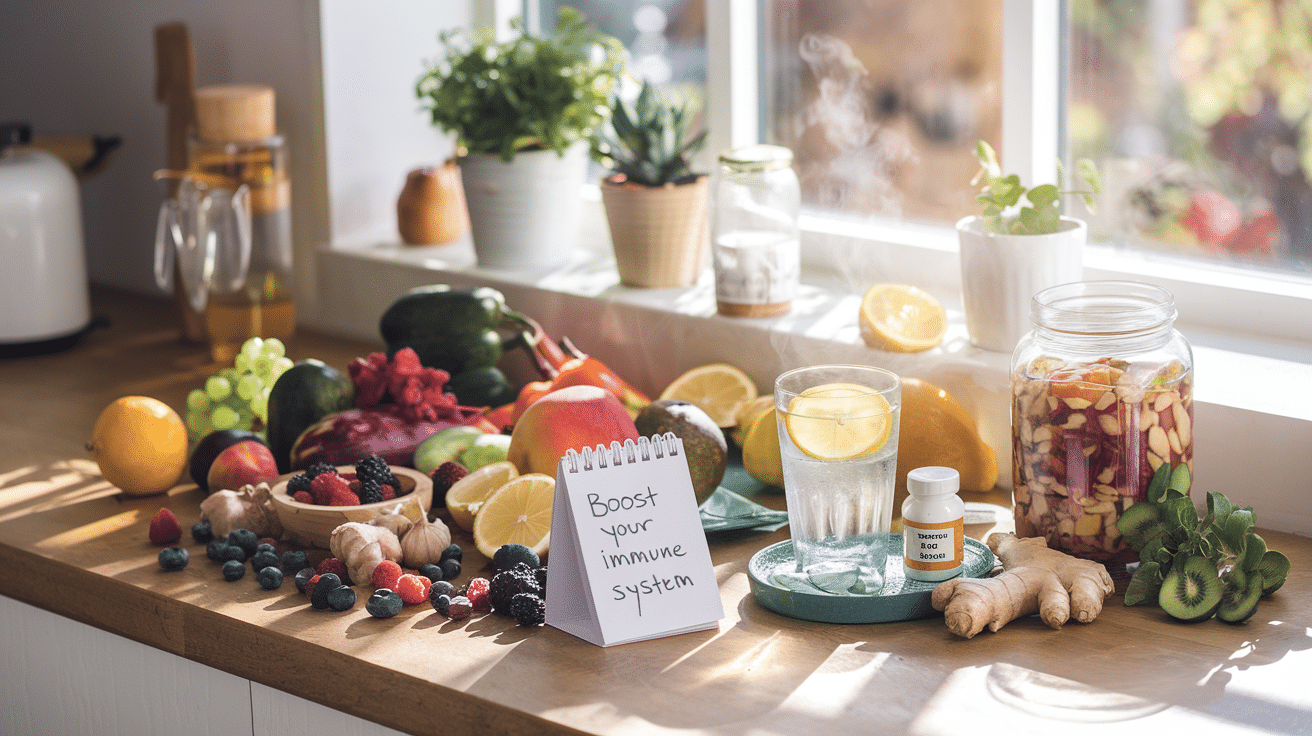Are you tired of constantly falling ill and feeling under the weather? 🤒 Your immune system is your body’s first line of defense against harmful pathogens, but it needs your support to function at its best. In today’s fast-paced world, where stress and unhealthy habits are commonplace, your immune system might be struggling to keep up.
But don’t worry! There’s good news. You can take simple, natural steps to give your immune system the boost it needs. 💪 Imagine feeling more energetic, falling sick less often, and bouncing back faster when you do catch a bug. It’s not just a dream – it’s completely achievable with the right approach.
In this blog post, we’ll explore seven easy and effective ways to naturally enhance your immune system. From nourishing your body with the right foods to mastering stress management techniques, you’ll discover practical tips that you can start implementing today. So, are you ready to take control of your health and give your immune system the support it deserves? Let’s dive in!
Nourish Your Body with Immune-Boosting Foods

Power up with colorful fruits and vegetables
Filling your plate with a rainbow of fruits and vegetables is one of the best ways to boost your immune system naturally. These colorful foods are packed with essential vitamins, minerals, and antioxidants that help protect your body against harmful pathogens.
Here’s a quick guide to the immune-boosting benefits of different colored produce:
| Color | Examples | Key Nutrients | Immune Benefits |
|---|---|---|---|
| Red | Tomatoes, Strawberries | Lycopene, Vitamin C | Antioxidant protection |
| Orange | Carrots, Sweet Potatoes | Beta-carotene | Enhances white blood cell function |
| Yellow | Bell Peppers, Pineapple | Vitamin C | Stimulates antibody production |
| Green | Broccoli, Spinach | Vitamin E, Folate | Supports overall immune function |
| Purple | Eggplant, Blueberries | Anthocyanins | Anti-inflammatory properties |
To maximize your intake of these immune-boosting foods:
- Aim for at least 5 servings of fruits and vegetables daily
- Include a variety of colors in each meal
- Opt for raw or lightly cooked options to preserve nutrients
- Snack on fresh fruit or vegetable sticks instead of processed foods
Embrace antioxidant-rich berries
Berries are nutritional powerhouses when it comes to supporting your immune system. These small but mighty fruits are packed with antioxidants, particularly flavonoids, which help protect your cells from damage caused by free radicals.
Incorporate probiotic-packed fermented foods
Your gut health plays a crucial role in your immune function. Fermented foods are rich in beneficial bacteria that support a healthy gut microbiome, thereby boosting your immune system.
Harness the benefits of garlic and ginger
Both garlic and ginger have been used for centuries in traditional medicine for their immune-boosting properties. These flavorful ingredients not only enhance your dishes but also provide powerful support to your body’s natural defenses.
Stay Hydrated for Optimal Immune Function
Drink plenty of water throughout the day
Staying hydrated is crucial for your immune system to function optimally. Aim to drink at least 8 glasses of water daily. Here’s why water is essential for your immunity:
- Helps flush toxins from your body
- Supports the production of lymph, which carries white blood cells
- Keeps your mucous membranes moist, creating a barrier against pathogens
To ensure you’re drinking enough water:
- Keep a reusable water bottle with you
- Set reminders on your phone
- Drink a glass of water with each meal
- Eat water-rich foods like cucumbers and watermelon
| Time of Day | Water Intake Goal |
|---|---|
| Morning | 2 glasses |
| Midday | 3 glasses |
| Afternoon | 2 glasses |
| Evening | 1 glass |
Enjoy immune-boosting herbal teas
Herbal teas not only contribute to your daily fluid intake but also provide additional immune-boosting benefits. Some excellent options include:
- Echinacea tea: Known for its ability to reduce the duration of colds
- Green tea: Rich in antioxidants that support immune function
- Ginger tea: Has anti-inflammatory properties
- Elderberry tea: May help fight off flu viruses
Try incorporating 1-2 cups of these teas into your daily routine for an extra immune boost.
Limit dehydrating beverages
While focusing on hydration, it’s important to be mindful of drinks that can actually dehydrate you. Limit your intake of:
- Alcohol
- Caffeinated beverages (coffee, energy drinks)
- Sugary sodas
These drinks can interfere with your body’s hydration levels and potentially weaken your immune system. If you do consume these beverages, balance them out by drinking extra water.
Now that you understand the importance of hydration for your immune system, let’s explore how quality sleep can further enhance your body’s natural defenses.
Prioritize Quality Sleep
Establish a consistent sleep schedule
Consistency is key when it comes to improving your sleep quality and boosting your immune system. By going to bed and waking up at the same time every day, you help regulate your body’s internal clock, known as the circadian rhythm. This consistency can lead to better sleep quality and duration, which in turn supports your immune function.
To establish a consistent sleep schedule:
- Choose a bedtime that allows for 7-9 hours of sleep
- Set a wake-up time and stick to it, even on weekends
- Use an alarm to remind you when it’s time to wind down
- Gradually adjust your schedule if needed, by 15-minute increments
Create a relaxing bedtime routine
A calming pre-sleep routine signals to your body that it’s time to rest, making it easier to fall asleep and improve sleep quality. Your bedtime routine should be personalized to your preferences, but here are some ideas to get you started:
- Take a warm bath
- Practice gentle yoga or stretching
- Read a book or listen to soothing music
- Try meditation or deep breathing exercises
Optimize your sleep environment
Your bedroom plays a crucial role in the quality of your sleep. Create a sleep-friendly environment by focusing on these factors:
| Factor | Recommendation |
|---|---|
| Temperature | Keep your room cool, between 60-67°F (15-19°C) |
| Lighting | Use blackout curtains or an eye mask to block light |
| Noise | Use earplugs or a white noise machine to minimize disturbances |
| Comfort | Invest in a supportive mattress and comfortable bedding |
Avoid screen time before bed
The blue light emitted by electronic devices can interfere with your body’s production of melatonin, the sleep hormone. To improve your sleep quality and support your immune system:
- Stop using electronic devices at least 1 hour before bedtime
- Enable blue light filters on your devices if you must use them
- Read a physical book or magazine instead of using an e-reader
- Try listening to podcasts or audiobooks as an alternative to screen-based entertainment
By prioritizing quality sleep through these strategies, you’ll be taking a significant step towards boosting your immune system naturally. With better sleep, your body can more effectively fight off infections and maintain overall health.
Manage Stress Effectively
Practice mindfulness meditation
Mindfulness meditation is a powerful tool for managing stress and boosting your immune system. By focusing on the present moment, you can reduce anxiety and promote overall well-being. Here’s how to get started:
- Find a quiet space
- Sit comfortably
- Close your eyes
- Focus on your breath
- Observe your thoughts without judgment
Start with just 5 minutes a day and gradually increase your practice time.
Try deep breathing exercises
Deep breathing exercises can help calm your nervous system and reduce stress hormones. Try this simple technique:
- Inhale deeply through your nose for 4 counts
- Hold your breath for 4 counts
- Exhale slowly through your mouth for 6 counts
- Repeat 5-10 times
Engage in regular physical activity
Physical activity is a natural stress-buster and immune booster. Aim for at least 30 minutes of moderate exercise most days of the week. Choose activities you enjoy, such as:
- Walking
- Swimming
- Cycling
- Yoga
- Dancing
Connect with loved ones
Social connections play a crucial role in managing stress and supporting your immune system. Make time for:
- Regular phone calls or video chats
- In-person gatherings (when safe)
- Shared activities or hobbies
Pursue enjoyable hobbies
Engaging in activities you love can significantly reduce stress levels. Consider trying:
| Hobby | Benefits |
|---|---|
| Gardening | Reduces cortisol levels, promotes relaxation |
| Painting | Enhances creativity, improves focus |
| Reading | Lowers heart rate, reduces mental stress |
| Cooking | Boosts self-esteem, promotes mindfulness |
By incorporating these stress management techniques into your daily routine, you’ll be better equipped to support your immune system naturally. Remember, consistency is key when it comes to managing stress effectively.
Exercise Regularly to Strengthen Immunity
Aim for moderate-intensity workouts
You don’t need to be a marathon runner to boost your immune system. Moderate-intensity workouts are your best bet for strengthening immunity. Aim for 150 minutes of moderate exercise per week, or about 30 minutes a day, five days a week. This can include brisk walking, cycling, or swimming.
| Exercise Type | Duration | Frequency | Benefits |
|---|---|---|---|
| Brisk Walking | 30 min | 5x/week | Improved circulation, stress reduction |
| Cycling | 30 min | 5x/week | Cardiovascular health, muscle strength |
| Swimming | 30 min | 5x/week | Full-body workout, low impact |
Incorporate strength training
Don’t forget to add strength training to your routine. It not only builds muscle but also enhances your immune function. Aim for two to three sessions per week, focusing on major muscle groups. You can use:
- Bodyweight exercises (push-ups, squats)
- Resistance bands
- Free weights
- Weight machines
Enjoy outdoor activities for added benefits
Taking your workouts outside can provide additional immune-boosting benefits. Outdoor activities expose you to:
- Vitamin D from sunlight
- Fresh air and nature
- Varied terrain for better balance and coordination
Try activities like hiking, gardening, or outdoor yoga to combine exercise with nature’s immune-boosting properties.
Listen to your body and avoid overexertion
While regular exercise is crucial for a strong immune system, overexertion can have the opposite effect. Pay attention to your body’s signals and adjust your workouts accordingly. If you’re feeling under the weather, opt for lighter activities like gentle stretching or a short walk. Remember, consistency is key in maintaining a strong immune system through exercise.
Now that you understand how to exercise for better immunity, let’s explore the importance of maintaining good hygiene habits in supporting your immune system.
Practice Good Hygiene Habits
Wash hands frequently and properly
Keeping your hands clean is one of the most effective ways to prevent the spread of germs and boost your immune system. Follow these steps for proper handwashing:
- Wet your hands with clean, running water
- Apply soap and lather well
- Scrub for at least 20 seconds, covering all surfaces
- Rinse thoroughly under running water
- Dry your hands using a clean towel or air dry
Remember to wash your hands:
- Before and after preparing food
- Before eating
- After using the bathroom
- After coughing, sneezing, or blowing your nose
- After touching pets or handling waste
Avoid touching your face
Your face is a gateway for germs to enter your body. Reduce the risk of infection by:
- Being mindful of face-touching habits
- Using tissues when you need to touch your face
- Keeping your hands occupied with stress balls or fidget toys
Keep commonly used surfaces clean
Regularly disinfect high-touch surfaces to minimize germ exposure:
| Surface | Cleaning Frequency |
|---|---|
| Doorknobs | Daily |
| Light switches | 2-3 times a week |
| Keyboards | Weekly |
| Phones | Daily |
| Remote controls | Weekly |
Use appropriate cleaning products and follow manufacturer instructions for best results.
Maintain personal hygiene
Good personal hygiene habits contribute significantly to your overall health and immunity:
- Shower or bathe regularly
- Brush your teeth twice daily and floss
- Keep your nails trimmed and clean
- Wear clean clothes and change bedding weekly
By incorporating these hygiene practices into your daily routine, you’ll create a strong defense against pathogens and support your immune system’s function. Next, we’ll explore how to supplement wisely to further enhance your body’s natural defenses.
Supplement Wisely
Consult with a healthcare professional
Before diving into supplements, it’s crucial to consult with a healthcare professional. They can assess your individual needs and recommend appropriate supplements based on your health status, diet, and lifestyle. Remember, what works for one person may not work for another.
Consider vitamin D supplementation
Vitamin D plays a vital role in immune function. While sunlight exposure is the best source, supplementation may be necessary, especially during winter months or for those with limited sun exposure.
| Vitamin D Source | Pros | Cons |
|---|---|---|
| Sunlight | Natural, free | Weather-dependent, skin cancer risk |
| Food sources | Natural, balanced | Limited options, may not meet needs |
| Supplements | Convenient, consistent | Potential for overdose, cost |
Explore the benefits of zinc
Zinc is essential for immune cell development and function. While it’s found in many foods, supplementation may be beneficial, especially during cold and flu season.
Some zinc-rich foods include:
- Oysters
- Beef
- Pumpkin seeds
- Lentils
Investigate other immune-supporting supplements
Several other supplements may support your immune system:
- Vitamin C: Known for its antioxidant properties
- Elderberry: May shorten the duration of colds and flu
- Echinacea: Potentially boosts white blood cell production
- Probiotics: Support gut health, which is closely linked to immunity
Remember, supplements should complement, not replace, a healthy diet and lifestyle. Always choose high-quality supplements from reputable sources, and be cautious of exaggerated claims. With these considerations in mind, you can make informed decisions about supplementing wisely to support your immune system.

Boosting your immune system naturally doesn’t have to be complicated. By incorporating simple habits into your daily routine, you can significantly enhance your body’s defense mechanisms. Remember to nourish your body with immune-boosting foods, stay hydrated, prioritize quality sleep, and manage stress effectively. Regular exercise and good hygiene habits are equally important in strengthening your immunity. Additionally, consider supplementing wisely to fill any nutritional gaps.
Your immune system is your body’s first line of defense against illness and disease. By taking these simple steps, you’re investing in your long-term health and well-being. Start implementing these strategies today, and you’ll be on your way to a stronger, more resilient immune system. Your body will thank you for the extra care and attention.


